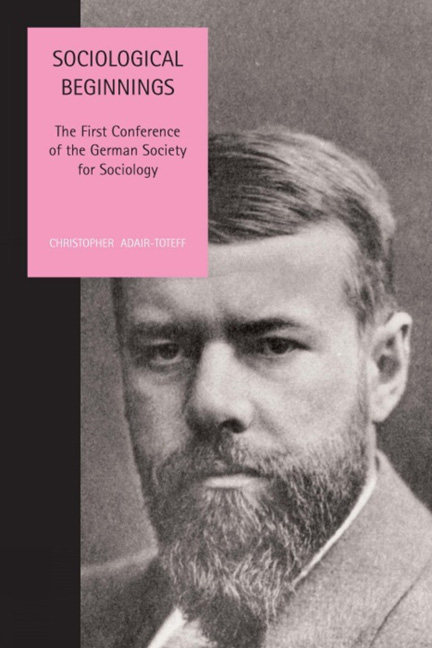Book contents
- Frontmatter
- Dedication
- Contents
- Preface
- A Note on Translation
- Chronology
- Short Biographies of the Main Participants
- Introduction
- The Papers of the First DGS Conference
- Georg Simmel – Sociology of Society
- Ferdinand Tönnies – Ways and Goals of Sociology
- Max Weber – Business Report followed by The Comparative Sociology of Newspapers and Associations
- Werner Sombart – Technology and Culture
- Ernst Troeltsch – Stoic–Christian Natural Law and Modern Profane Natural Law
- Select Bibliography
- Index
Werner Sombart – Technology and Culture
from The Papers of the First DGS Conference
- Frontmatter
- Dedication
- Contents
- Preface
- A Note on Translation
- Chronology
- Short Biographies of the Main Participants
- Introduction
- The Papers of the First DGS Conference
- Georg Simmel – Sociology of Society
- Ferdinand Tönnies – Ways and Goals of Sociology
- Max Weber – Business Report followed by The Comparative Sociology of Newspapers and Associations
- Werner Sombart – Technology and Culture
- Ernst Troeltsch – Stoic–Christian Natural Law and Modern Profane Natural Law
- Select Bibliography
- Index
Summary
[Thursday Afternoon, 20 October 1910
Opening address by the Chairman, Professor Tönnies:
Honoured assembled members, today's session of the first sociology conference is continued. I give the floor to Professor Dr Werner Sombart, for his lecture.]
The broad conception of my theme of ‘Technology and Culture’ naturally makes it necessary to give it an entirely general treatment; and in order for this entirely general treatment to have some success, I have planned to treat it in an essentially methodological–programmatic–problematic–dispositionary manner. That means that I would like to give you a few examples to answer the question: What is the significance of placing ‘and’ between the words ‘technology’ and ‘culture’? My speech – my lecture – will be, then, in three parts: two short parts, in which I will speak first on technology as I conceive of it; and second, on the concept of culture; and for the third and longer part I will offer an analysis of the little word ‘and’.
In the broadest sense of the word ‘technology’, we could use any procedures, any part or combination of parts and all systems, of any degree of complexity, to achieve a specified goal with it. In this broadest sense there could be, for example, a technology of song, a technology of speaking, a technology of war, a technology of flight, a technology of speech, a technology of drama – indeed there is supposedly even a technology of love, the ars amandi (art of love) of the ancients. However, when we speak of technology and culture as a theme of a lecture, we clearly mean something narrower and, by implication, the use of particular methods or the application of specific resources to a specific object or objects in order to reach a specific goal. If, for example, we speak of a technology of medical operations, we mean first the entire procedure the surgeon applies to a patient; but second, in a narrower sense, we mean the employment of specific instruments, antiseptic agents and the like.
Technology is always concerned with the employment of an instrument, if I may be permitted to say so, and instruments can, in turn, be used in the most varied ways: instruments for music; instruments for warfare; instruments for removing teeth, etc.
- Type
- Chapter
- Information
- Sociological BeginningsThe First Conference of the German Society for Sociology, pp. 94 - 109Publisher: Liverpool University PressPrint publication year: 2005

